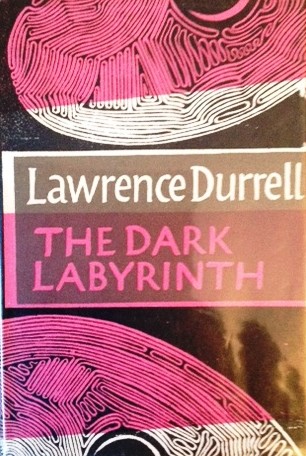Inspiring Older Readers
 posted on 23 Feb 2022
posted on 23 Feb 2022
The Dark Labyrinth by Lawrence Durrell
When I was in my late teens and early twenties and in something of an uncritical frenzy of discovery when it came to reading in general and modern fiction in particular, Lawrence Durrell’s books had something of a cool cachet about them. I suspect this time represented the high-watermark for Durrell’s reputation and it really wasn’t too long before his subject matter, his writing style and his persona as a creative bohemian started to draw more adverse, critical attention.
His most famous novel sequence, The Alexandra Quartet, still has its admirers – as does some of his travel writing – but his wider body of fiction is not, I think, widely read by modern audiences. This plunge in his reputation goes hand-in-hand with a more rounded understanding of Durrell the man – he was, it seems, a bit of a stinker. To illustrate just how unbearable he was, I can’t do much better than to quote from the review website Kirkus who said this during its review of Gordon Bowker’s biography of Durrell:
“he was personally unpleasant, abusive, misogynistic, blithely lecherous, cantankerous, an inveterate drunk. Writing tended to goad him into a state bordering on madness, drawing those around him into the fecund maelstrom, often with unpleasant results. He wrote quickly, anxiously; many of his greatest books were produced in a matter of months. Though a proponent of Freudian analysis, he stayed far away from the analyst's couch, afraid the talking cure would dissipate his creativity.”
The Dark Labyrinth is one of Durrell’s early novels – it was first published in 1948 as Cefalù but republished under in current title when Faber took it on in 1958. The fact that it was one of Durrell’s earlier attempts means that its mercifully free of the more complicated structural experiments that came along later but sadly not entirely devoid of the rather static psychology and mysticism that gets loaded into the dialogue and which threatens to obscure the relative simplicity of the plot with turgid digressions.
Set on an island remarkably like Crete and utilising the myth of the Minotaur and the labyrinth it inhabited, Durrell sets up a circular story where the reader knows from the outset some of the key events that will happen in the novel. We know that a small party of tourists make an excursion to the labyrinth, some kind of disastrous accident occurs and, as a result, some survive and others are lost. Quite how they survive and how they are lost is part of what we will find out as the story runs its course.
The real focus is on the cast of characters, some of them already acquainted before the trip and others who set out as strangers to each other. Each individual or couple effectively gets their story told in a sort of fluid portmanteau format that enables us to see them as more rounded characters.
The publisher's blurb for the book puts it this way:
“ The story is set on Crete just after the War, as an odd assortment of English travellers come ashore from a cruise ship to explore the island and in particular to examine a dangerous local labyrinth. They include an extrovert painter, a spiritualist, a Protestant spinster with a fox terrier, an antiquarian peer and minor poet, a soldier with guilty memories of the Cretan resistance, a pretty convalescent and an eccentric married couple.”
We get to examine the desires, aspirations and life histories that have led this sundry collection of people to their critical moment – for some there will be escape, for some death and for some a sort of living death lost to civilisation. The story has enough vigour and jeopardy to make it a page turner despite Durrell’s tendency to pontificate in the way I mentioned earlier. The book is clearly influenced by E.M. Forster's A Passage to India and, in turn, may well have influenced John Fowles’ The Magus which comes along in 1965. I know that sounds like a pretty unholy combination but it’s the closest I can get to describing the blend of readable adventure and slightly cockeyed philosophical conjecture.
The be honest, I picked the book up out of nostalgic curiosity and I didn’t really expect to enjoy it – but it confounded my expectations and I pretty much romped through it.
A rather nicely designed new Faber paperback edition was issued in 2021 and can be purchased for under £10 but you’ll pay double that for a Faber hardback from 1958.
Terry Potter
February 2022